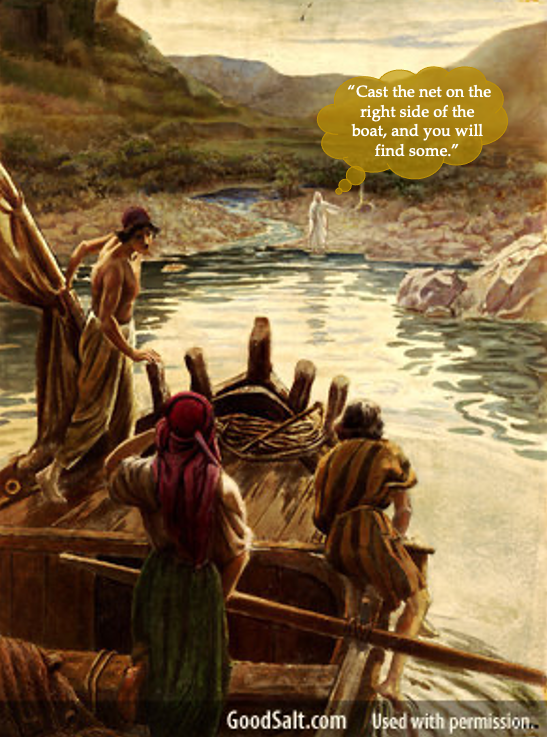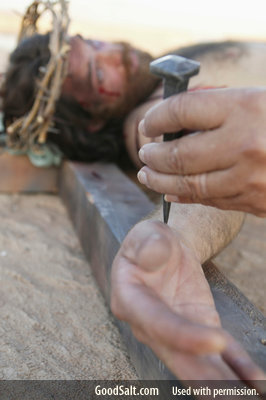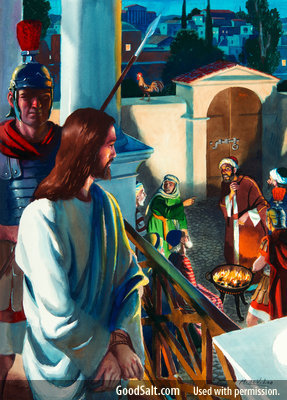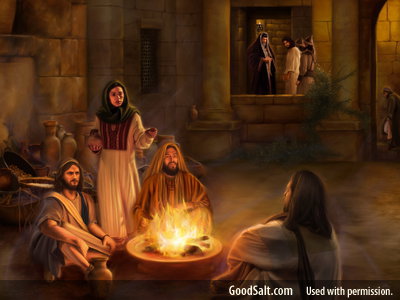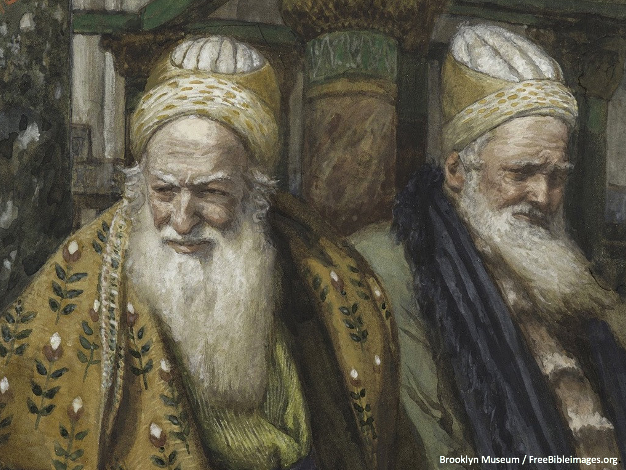“So when they had eaten breakfast, Jesus said to Simon Peter, ‘Simon, son of Jonah, do you love Me more than these?’ He said to Him, ‘Yes, Lord; You know that I love You.’ He said to him, ‘Feed My lambs.’ ” John 21:15
On October 25, 1964, the Minnesota Vikings of the National Football League were playing the San Francisco 49ers in San Francisco, CA. Carl Eller of the Vikings had just scooped up a 49er fumble and turned it into a touchdown.
Working hard to get back the touchdown, 49er quarterback, George Mira, threw a short pass into the secondary to halfback Bill Kilmer. Jim Marshall of the Vikings quickly diagnosed the play and headed for Kilmer. Marshall got there quickly when someone hit Kilmer and the 49er halfback fumbled. Reacting instinctively, Marshall hurdled a player in front of him and, on the run, picked up the loose ball. Without hesitation he began sprinting for the goal line – the Minnesota goal line sixty-six yards away.
Marshall had simply gotten mixed up. And the roar of the crowd drowned out his teammate’s shouts to turn around. Marshall ran into the end zone without opposition and then threw the football away in celebration. He began to realize something was wrong when San Francisco’s Bruce Bosely threw his arms around him, thanking him for the safety. The Viking quarterback, Fran Tarkenton, ran up and said, “Jim, you went the wrong way, the wrong way!” Marshall buried his head in his hands for a few agonizing moments and then jogged back to the bench.
Viking’s coach Norm Van Brocklin, a man with a notoriously short temper, realized that the situation was not one that called for angry words. He smacked Marshall on the backside and said, “Forget about it, Jim. Go back in there and make the fans forget.” For the rest of the game Marshall played excellent football. Minnesota went on to win 27-22. No doubt Marshall expected the coach to bench him for his blunder. But he didn’t. He gave him a second chance. He told him “To forget it. Go back in there and make the fans forget.”
Have you ever run the wrong way in your Christian life, not listening to God or to others who are trying to tell you to turn around? It happens to all of us. And we may then feel God wants to bench us and not let us back into the game. We feel like a failure and tell ourselves, “God cannot use failures.”
If you have ever felt that way, it would profit you to take a look at how the risen Lord Jesus responded to Peter in John 21:15-19 after Peter had failed the Lord in a big way. Before we look at these verses, I want to point out that discipleship is a lifelong process which includes periods of failure in our lives. If you recall, Peter had already vowed to lay down his life for Jesus’ sake when he was in the Upper Room with Christ and the other disciples (John 13:37). But Jesus then said to Peter, “Will you lay down your life for My sake? Most assuredly, I say to you, the rooster shall not crow till you have denied Me three times.” (John 13:38).
Keep in mind that Peter had already believed or trusted in Jesus for eternal life over three years earlier (cf. John 1:40-2:11; cf. 6:69). He was already a Christian. But Christ says to Peter there is going to be a period of time when he is going to deny knowing Jesus “three times.”
In John 21, seven of Jesus’ disciples were sitting around “a fire of coals” on a beach along the Sea of Galilee with Jesus after He rose from the dead (John 21:1-14). It was dawn; quiet and cool. Smoke drifted lazily from the fire as well as the aroma of freshly toasted bread and smoked fish. No doubt small talk and a few laughs occurred as they ate breakfast. Surely someone commented on how good it was to miraculously catch over one-hundred fifty large fish so quickly after Jesus instructed these fishermen to cast their net on the other side of their boat.
Suddenly the conversation stopped, and Jesus turned to Simon Peter. Their eyes met. “So when they had eaten breakfast, Jesus said to Simon Peter, ‘Simon, son of Jonah, do you love Me more than these?’ ” (John 21:15). When the disciples had finished eating breakfast with the risen Lord Jesus, Christ asked Peter three questions in front of his companions. These questions would probe the depths of Peter’s heart and would stand in contrast to Peter’s three denials.
You may recall the night before Jesus’ crucifixion, during our Lord’s trial, Peter had vehemently denied three times that he was associated with Jesus (John 18:17-18, 25, 27). Now the risen Lord Jesus was giving Peter a chance to redeem himself. Three times Peter had said he did not even know the Lord Jesus, now three times he would say he loved the Lord. Peter’s failure took place while standing around “a fire of coals” (John 18:18) in the courtyard in front of Annas’ house (John 18:15-16), and now his restoration would take place while around “a fire of coals” on the beach (John 21:9).
I believe Peter knew what was coming. He may have returned to fishing because of his three public denials of Jesus. He may have had doubts about his future considering his failure. He stood around this fire like a condemned man before his Judge. There was no need for a trial; the evidence was indisputable – it shouted of his conviction! Then Jesus did something amazing, so amazing that few people grasp the magnitude of the question, instead they read an accusation into Jesus’ words. 1
Jesus addresses Peter with an air of seriousness when He says, “Simon, son of Jonah.” “In the Gospels, Jesus addressed Peter this way on only the most important occasions. These were: Peter’s call to follow Jesus (1:42), his confession of Jesus as the Son of God (Matt. 16:17), and as he slept in Gethsemane (Mark 14:37). When Jesus addressed Peter this way here, Peter probably realized that what Jesus was about to say to him was extremely important.” 2
Jesus said to Peter, “Do you love Me more than these?” Notice that Jesus doesn’t ask Peter if he is going to deny Him again. Nor does Christ ask Peter if he was sorry for what he had done. He didn’t interrogate Peter to find out if he was going to try harder the next time he is in a similar situation. He simply asked Peter if he loved Him. 3
Much discussion has revolved around the use of the words for “love” used by Jesus (agapaō) andPeter (phileō). Before we look at that, I want to point out something that is often overlooked in this passage. Jesus made Himself vulnerable by asking Peter if he loved Him. Haven’t all of us, at some point in time, asked someone if he or she really loves us? If we are married, we certainly have. I know I have asked my wife many times if she loved me, especially after I had offended her or deeply hurt her. I felt so vulnerable during those times. We all do in a situation like that.
Jesus made Himself vulnerable in this conversation with Peter. Peter was probably expecting Jesus do reprimand him for his public denials knowing he deserved a painful rebuke. But he hears the risen Lord Jesus ask if he loved Him. When we ask a question like that, we all put our heart right out there on the line. Even God does this with Peter!
Jesus Christ was not only vulnerable when He came to earth and lay in a manger as a Baby, or when He was faced with the failures and humanness of His disciples, knowing one of them would eventually betray Him. Nor was the cross, where He made Himself extremely vulnerable to everyone’s sin and suffering, the only place of His vulnerability. Christ’s entire life on earth was one of unguarded servanthood to humanity. “Do you love Me?” is a constant expression of Jesus’ heart.
That simple question can transform a broken heart that is overtaken by failure. It certainly changed Peter’s relationship with his Savior. And it can change ours. When Jesus asked Peter this question, He was looking beyond Peter’s behavior to his heart. Christ is focusing on Peter’s heart, not his past failure. Why? Because a person cannot change their behavior until their heart has been changed.
All too often the Christian church is preoccupied with the behaviors of its members instead of their hearts. They can be quick to condemn believers who have failed. They may constantly remind fallen Christians of their sinful behavior, while failing to offer hope and healing to them by focusing on their hearts.
Jesus was probing Peter’s heart with His questions. Peter had been preoccupied with himself earlier when he claimed to have more commitment than the other disciples (Matthew 26:31-33; John 13:37). He was focused on himself when he failed Jesus in the courtyard and began to curse and swear and weep bitterly (Matthew 26:74-75). But Jesus’ question was bringing Peter’s focus back to Him.
The truth is all of us can be like Peter. I know I can and have many times. We can get so full of ourselves, that we cannot see Jesus. We get so focused on whether we are okay and appreciated by others, that we lose sight of our love for Jesus.
When Jesus asked Peter if he loved Him, I can just picture Peter looking at the ground, probably moving some dirt around with his water-logged sandals and then saying, “Yes, Lord; You know that I love You.” Peter seems to be saying, “Lord, when I get my head on straight and my heart isn’t so polluted, I really do love You. And I want to love You – at times more than anything else in my life. But, Lord, I really don’t know the truth about my heart most of the time. Yet You do, and that’s why Your name is Wonderful Counselor, the Mighty God.” 4
Jesus’ full question was, “Do you love Me more than these?” This was not a performance question. This was a heart question. Jesus uses the Greek word agapaō for unconditional love. This word is often used of God’s sacrificial love to do what is best for another (cf. John 3:16; I John 4:9-10).
Peter knew what Jesus meant by “these” (toutōn), but it is not as clear to us. Some suggest that Jesus is asking Peter if he loves Christ more than the fishing vocation he has returned to. I don’t take it this way.
I believe Jesus is asking Peter, “Do you unconditionally love Me more than the other disciples love Me?” “Why would Jesus ask this? Because when he had predicted that the disciples would fall away, Peter had vowed, ‘Even if everyone falls away because of you, I will never fall away’ (Matt 26:31-33). Peter had wanted Jesus to know that though the devotion of the other disciples might waver, he could count on Peter remaining steadfast. He would be the one disciple that Jesus could trust. But here, after Peter had shamefully denied Jesus three times, Jesus basically asked Peter, ‘Are you still the most committed disciple?’ ” 5 Jesus is asking Peter, “Can you still affirm that you love Me more than these other disciples do?”
So, Jesus is taking Peter back to the worst failure of his life, not to condemn him, but to give him hope and to develop a new depth of intimacy with Him. 6
Peter responds, “Yes, Lord; You know that I love You.” Notice that Peter appeals to Jesus’ knowledge as proof of his love for Jesus, not his own former behavior. 7 Peter uses the Greek word phileō for “love” here. This word means “to have a special interest in someone or something … with focus on close association, have affection for, like, consider someone a friend.” 8 This is the kind of love that exists between good friends. 9
Some Bible students believe that the word Peter used for love (phileō) is inferior to the word Jesus used for love (agapaō). 10 So, when Peter responded to Jesus, they believe his failures had humbled him. “Peter had claimed that his love for and commitment to Jesus was superior to that of the others. But after his failure and denial, he wasn’t willing to arrogantly say that he loved Jesus with a sacrificial love.” 11
Other Bible students believe the use of agapaō and phileō are used interchangeably in the gospel of John and do not see any actual difference in meaning. 12 “The word phileō does not represent an inferior type of love. John, for example, uses phileō, to refer to the Father’s love for Jesus (5:20). Surely the Father’s love for Jesus is not some lesser love! In addition, Jesus’ love for John and for Lazarus is expressed by phileō (11:3, 36; 20:2), as is the Father’s love for the disciples and the disciples’ love for Jesus (16:27). The change was merely for stylistic considerations—much like the change from ‘Feed My lambs’ to ‘Tend My sheep’ to ‘Feed My sheep.’” 13
In the context, I prefer the former view, that Peter uses a word for love (phileō) that is not as strong because he doesn’t feel worthy of unconditional love. Peter doesn’t have enough confidence to say he loves Jesus unconditionally more than his fellow disciples do because he had just failed the Lord miserably.
How does Jesus respond to His discouraged disciple? “He said to him, ‘Feed My lambs.’ ” The word for “feed” (boskō) is used of herdsmen who feed or “tend to the needs of animals” 14 or their herds(Matthew 8:30; Mark 5:14; Luke 8:34; 15:15). The verb means “to take care of,” not merely “feed.” 15
The “lambs” (arnia) refer to Christ’s followers, especially the young ones in the faith who may be prone to wander. 16 When Jesus said this, what kind of look do you think was on His face? Was he frowning or doubting? I am convinced that Jesus was smiling from ear to ear.
Jesus wasn’t done with Peter yet. Earlier he told Peter he would fish for men (Matthew 4:19; Luke 5:10), which was more of an evangelistic ministry. But now Christ is telling him to “Feed My lambs” which is more of a pastoral ministry. “Previously Jesus had referred to Himself as the Good Shepherd (10:14). Now He was committing the care of His flock to this disciple who had failed Him miserably in the past.” 17
How does Jesus restore us after we fail? The first way is HE INVITES US TO MAKE LOVING HIM OUR FIRST PRIORITY (John 21:15). What motivates our lives or ministries? What motivates us to serve others? Is it the promise of a payment or reward? I’m not just talking about money, but also appreciation or approval from others. Is it the prestige of being in leadership? Is it the sense of power or control over others that motivates us?
Jesus asked Peter, “Do you love Me more than these?” Peter’s answer is, “Lord, You know that I love you.” Not “more than,” just “You know that I love You.” And Jesus says, “Feed My lambs.”
So, Jesus says if you really want to feed people, the first question is do you love Him? If God is going to use us to make a difference in the lives of other people after we fail Him miserably, we must make loving Jesus our number one priority.
Jesus is giving Peter (and us) an entirely new set of priorities for living. He uses our failures to establish new priorities in our Christian lives. It was one thing for Peter to be excited about an empty tomb on Easter Sunday. It was quite another thing to let the truth of the resurrection change the way he lived his life. It is one thing for us to come to church on a Sunday and be excited and give a standing ovation to a great song or an “Amen” to a great sermon. We may feel close to the Lord during those times. But it is quite another thing for us to let that truth change the way I treat my wife or my kids at home or the way I act at work the next day. If we are honest with ourselves, it is very difficult to make the leap between Sunday’s experience and Monday’s reality.
Jesus is helping us learn how to do this. First, He is telling us, “Make loving Me the top priority in your life. If you want to love other people, first love Me. Take time to connect with Me. That’s where the strength comes from to love others.” Take time every day to get to know Jesus. Get alone and talk to Him in prayer and listen to Him speak to you as you read and obey the Bible. We cannot get to know and love Jesus if we don’t spend time with Him.
And if we are not taking the time to know and love Jesus, we are not going to last in ministering to others. We will get burned out and dry up spiritually. Other people cannot love us the way Jesus can. Other people cannot strengthen us the way Jesus can. Make loving Christ your number one priority in life, and He will use you to make an eternal difference in the lives of other people.
Prayer: Lord Jesus, we must admit that we are a lot like Peter. We can start out relying on ourselves to remain committed to You even unto death. We get so focused on ourselves that we do not even see You. But we soon find out, like Peter did, that that is a recipe for failure. Thank You, Lord Jesus, for giving us the grace we need so that our failures are not final. Thank You for focusing more on our hearts than on our behaviors. By Your grace, we want to make loving You our top priority in life. Lord Jesus, there is no one who loves us more than You do. There is no one who forgives us more than You do. Please use us to make a difference in someone’s life today. Would You use us to do that, Lord Jesus? Would You love that person through us, our Lord and our God? Thank You for hearing our prayer. In Your mighty name we pray Lord Jesus. Amen.
ENDNOTES:
1. Ted Roberts, Pure Desire (Minneapolis, MN: Bethany House, 1999), pg. 246.
2. Tom Constable, Notes on John, 2017 Edition, pg. 394.
3. Adapted from Ted Robert’s discussion in his book, Pure Desire, pp. 246-247.
4. Ibid., pp. 248-249.
5. Tony Evans, CSB Bibles by Holman. The Tony Evans Bible Commentary (B & H Publishing Group, Kindle Edition, 2019), pg. 1831.
6. Roberts, pg. 249.
7. Constable, pg. 395.
8. Walter Bauer, A Greek-English Lexicon of the New Testament and Other Early Christian Literature: Third Edition (BDAG) revised and edited by Frederick William Danker (Chicago: University of Chicago Press, 2000 Kindle Edition), pg. 1056.
9. Evans, pg. 1832.
10. Constable, pg. 395 cites K. L. McKay, “Style and Significance in the Language of John 21:15-17,” Novum Testamentum 27 (1985):319-33; Kenneth S. Wuest, Wuest’s Word Studies from the Greek New Testament, vol. 4: “Golden Nuggets from the Greek New Testament” (by the author, 1940; reprint ed., Grand Rapids: Wm. B. Eerdmans Publishing Co., 1966), pp. 60-63; and Robert L. Thomas, Evangelical Hermeneutics, The New Versus the Old (Grand Rapids: Kregel Publications, 2002), pg. 227; See also J. Carl Laney Moody Gospel John Commentary (Chicago: Moody Press, 1992), pg. 379 who cites William Hendriksen, Exposition of the Gospel According to John (Grand Rapids: Baker, 1953-54), 2:494-500; R. C. H. Lenski, The Interpretation of St. John’s Gospel (Minneapolis: Augsburg, 1942), pp. 1418-20; A. Plummer, The Gospel According to St. John (Cambridge: At the University Press, 1899), pg. 372; B. F. Westcott, The Gospel According to St. John (Grand Rapids: Eerdmans, 1973), pg. 303.
11. Evans, pg. 1832.
12. Laney, pg. 380 cites C. K. Barrett, The Gospel According to St. John (London: SPCK, 1962), pg. 486; F. F. Bruce, The Gospel of John: Introduction, Exposition and Notes (Grand Rapids: Eerdmans, 1983), pp. 404-405; Leon Morris, The Gospel According to John, NICNT (Grand Rapids: Eerdmans, 1971), pg. 873; Leon Morris, Studies in the Fourth Gospel (Grand Rapids: Eerdmans, 1969), pp. 293-318.
13. Robert Wilkin; J. Bond; Gary Derickson; Brad Doskocil; Zane Hodges; Dwight Hunt; Shawn Leach. The Grace New Testament Commentary: Revised Edition (Grace Evangelical Society, Kindle Edition, 2019), pg. 569; and see Tom Constable, Notes on John, pg. 395 where he writes, “For example, John used both agapao and phileo to describe the Father’s love for the Son (3:35; 10:17; 5:20), Jesus’ love for Lazarus (11:5, 3, 36), and Jesus’ love for the beloved disciple (13:23; 20:2). Also, he used three different Greek words to describe ‘fish’ in this passage: prosphagion, ichthus, and opsarion.”
14. Bauer, pg. 181.
15. Laney, pg. 380.
16. Ibid.
17. Constable, pg. 396.



